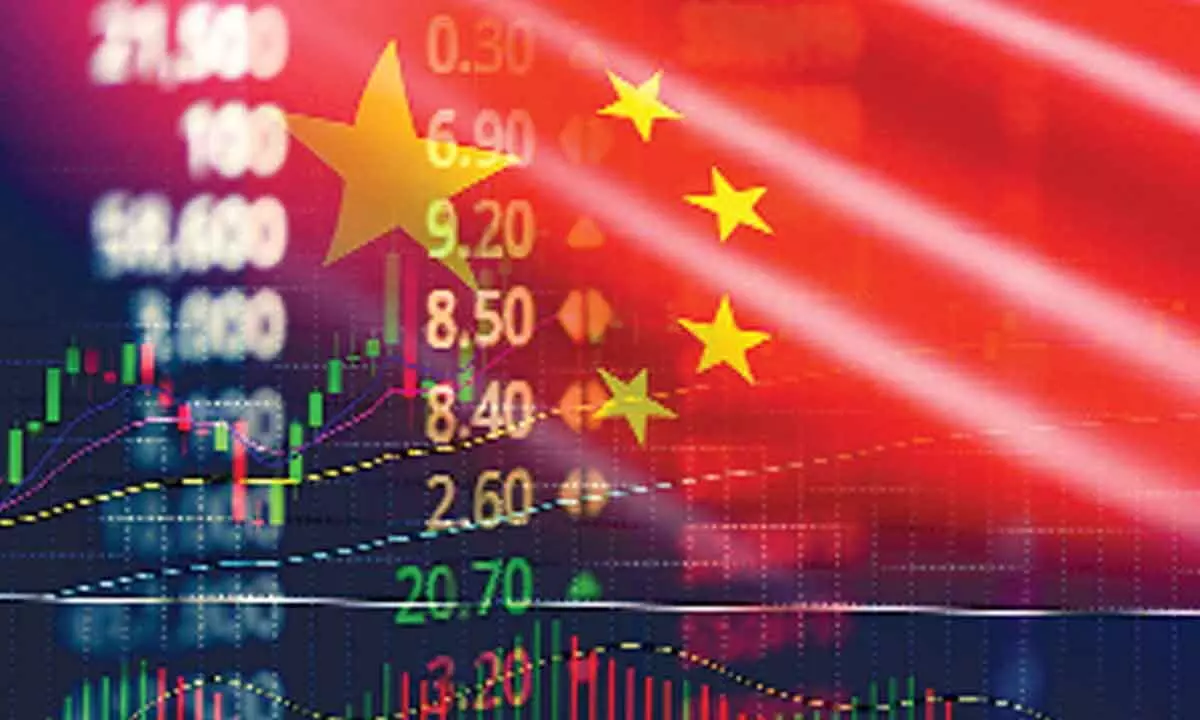Bank fears send Asia shares mostly lower
Australia's S&P/ASX 200, Hong Kong's Hang Seng slipped, South Korea's Kospi, Shanghai Composite edge up
image for illustrative purpose

The worry is that it and other smaller and mid-sized banks could suffer debilitating runs of deposits from customers, similar to the ones that caused last month's failures of SVBand Signature Bank. All banks are contending with much higher interest rates, which have flown higher over the past year to tighten the screws on the economy and financial markets. The Federal Reserve's key overnight interest rate is at its highest level since 2007
Tokyo: Asian shares mostly fell on Thursday, echoing the drop on Wall Street, as worries about the US banking sector and inflationary pressures weighed on investor sentiment. Japan's benchmark Nikkei 225 declined 0.2 per cent in morning trading to 28,349.95. Australia's S&P/ASX 200 slipped 0.4 per cent to 7,288.70. South Korea's Kospi rose nearly 0.1 per cent to 2,486.90. Hong Kong's Hang Seng lost 0.1 per cent to 19,730.31, while the Shanghai Composite added 0.3 per cent to 3,274.59. “Asian equities were lower on Thursday as turmoil in the banking sector looms large,” Anderson Alves of ActivTrades said in a markets commentary. On Wall Street, the S&P 500 dropped 0.4 per cent to 4,055.99. The Dow Jones Industrial Average fell 0.7 per cent, to 33,301.87, while the Nasdaq composite led the market with a gain 0.5 per cent, to 11,854.35. Wall Street was coming off its worst day in a month, hurt by concerns about the strength of US banks.
The spotlight has been harshest on First Republic Bank, which lost another 29.8 per cent after nearly halving the day before. That's when it gave details about how many customers bolted amid last month's turmoil in the industry. The worry is that it and other smaller and mid-sized banks could suffer debilitating runs of deposits from customers, similar to the ones that caused last month's failures of Silicon Valley Bank and Signature Bank. Even without more shutdowns, the industry's struggles could cause a pullback in lending by banks that saps the economy. Activision Blizzard, meanwhile, tumbled 11.4 per cent after UK regulators blocked its takeover by Microsoft on concerns it would hurt competition in the cloud gaming market. While the majority of stocks fell, gains for Microsoft and other Big Tech companies prevented a sharper slide for the market.
Microsoft rose 7.2 per cent after reporting stronger profit for the first three months of the year than analysts expected. It carries a huge weight on the S&P 500 as the second-largest stock in the index. Tech stocks have been some of the year's best performers so far as they've laid off workers and made other cost cuts to improve their profitability. Hopes the Federal Reserve will back away from its barrage of interest rate hikes have helped.
Google's parent company, Alphabet, turned a bigger profit than expected but its stock slipped 0.2 per cent after reporting its first back-to-back drops in advertising revenue from a year earlier since it became a publicly traded company in 2004. More Big Tech companies are scheduled to follow with their own reports soon. Facebook's parent company, Meta Platforms, rose 0.9 per cent ahead of its report. It jumped in afterhours trading after it said it earned more than expected. Chipotle Mexican Grill rose 12.9 per cent for the biggest gain in the S&P 500 after reporting stronger profit than expected. It was one of a few companies that raised hopes vital consumer spending could remain resilient despite a slowing economy. Mark Haefele, UBS Global Wealth Management's chief investment officer, expects stocks to stay stuck in a range since they look relatively expensive and investors are worried about a possible recession. That means “the scope for upside appears limited, in our view,” he said. Scott Wren, senior global market strategist at Wells Fargo Investment Institute, sees the S&P 500 largely remaining within a range of 3,700 to 4,200 this year. It's within the top half of that range, and he said he's not looking to “chase this equity rally.”
All banks are contending with much higher interest rates, which have flown higher over the past year to tighten the screws on the economy and financial markets. The Federal Reserve's key overnight interest rate is at its highest level since 2007. High rates slow the entire economy and hurt prices for investments. Apart from cracks in the banking system, high rates have slowed the housing, manufacturing and other industries. The job market, meanwhile, remains relatively solid. A report on Wednesday showed orders for long-lasting manufactured goods were stronger in March than expected. In the bond market, the yield on the 10-year Treasury rose to 3.43 per cent from 3.40 per cent late Tuesday. It helps set rates for mortgages and other loans. The two-year Treasury yield, which more closely tracks expectations for the Fed, fell to 3.92 per cent from 3.95 per cent late Tuesday.
In energy trading, benchmark US crude added 13 cents to $74.43 a barrel in electronic trading on the New York Mercantile Exchange. Brent crude, the international standard, rose 24 cents to $77.93 a barrel. In currency trading, the US dollar inched down to 133.59 Japanese yen from 133.66 yen. The euro cost $1.1047, up from $1.1042. (AP)

